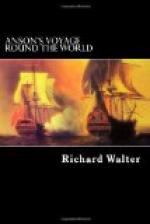(Note. William III defeated James II and his army of Irish and French troops July 12th, 1690.)
THE ISLAND OF SOCORO.
With this terrible disease we struggled the greatest part of the time of our beating round Cape Horn. We entertained hopes that when we should have once secured our passage round the Cape, we should put a period to this and all the other evils which had so constantly pursued us. But it was our misfortune to find that the Pacific Ocean was to us less hospitable than the turbulent neighbourhood of Tierra del Fuego and Cape Horn; for being arrived, on the 8th of May, off the island of Socoro, which was the first rendezvous appointed for the squadron, and where we hoped to have met with some of our companions, we cruised for them in that station several days. And here we were not only disappointed in our hopes of being joined by our friends, and thereby induced to favour the gloomy suggestions of their having all perished, but we were likewise perpetually alarmed with the fears of being driven on shore upon this coast, which appeared too craggy and irregular to give us the least hopes that in such a case any of us could possibly escape immediate destruction. For the land had indeed a most tremendous aspect; the most distant part of it, and which appeared far within the country, being the mountains usually called the Andes or Cordilleras, was extremely high, and covered with snow; and the coast itself seemed quite rocky and barren, and the water’s edge skirted with precipices. As we were utterly ignorant of the coast, had we been driven ashore by the western winds, which blew almost constantly there, we did not expect to have avoided the loss of our ship and of our lives.
And this continued peril, which lasted for about a fortnight, was greatly aggravated by the difficulties we found in working the ship; as the scurvy had by this time destroyed so great a part of our hands, and had in some degree affected almost the whole crew. Nor did we, as we hoped, find the winds less violent as we advanced to the northward; for we had often prodigious squalls, which split our sails, greatly damaged our rigging, and endangered our masts.




